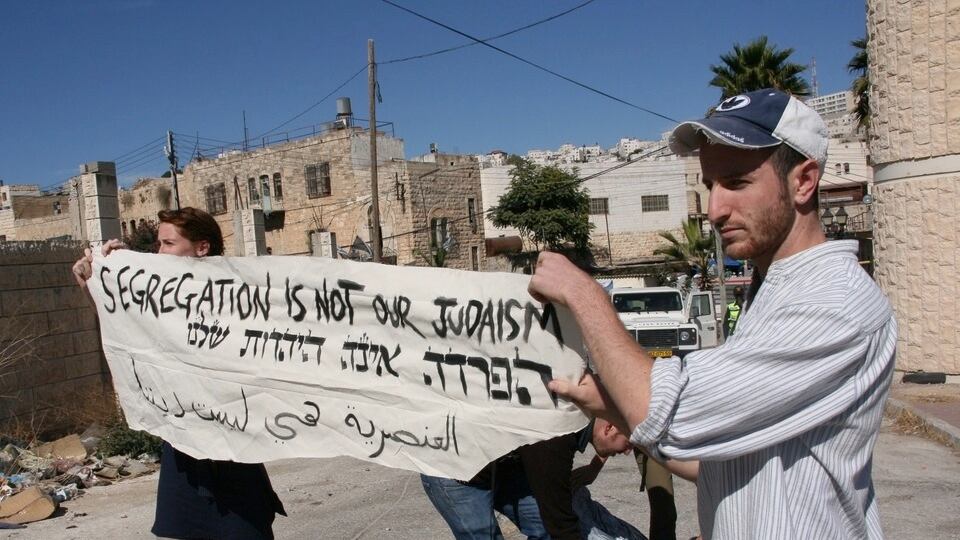On Friday, just before midnight, I was shivering in the Hebron chill, trying to make sense of the day’s events, including the fact that a group of seven of us were arrested in the mid-afternoon sun for learning Torah in Hebron.
That morning I had climbed onto a southbound bus in Tel Aviv-Yaffa to catch the ride to Hebron in order to learn about Jewish literature, history and the occupation as it manifests in that city. With the long rectangular box holding the tent that we were going to study in under my arm, I held on to an open bus railing and felt as if all eyes were on me. I felt as if I was carrying something dangerous. I wondered if anyone could guess where I was heading or if anyone cared.

The group I arrived in Hebron with was made up of members of the All That’s Left Collective. While we are active members, we don’t speak for the group. Our aim was to jump into the sea of Jewish pilgrims marking the annual reading of the Torah portion called Hayei Sarah, in which Abraham buys a burial plot in Hebron for his wife, Sarah.
For many years Hebron has been seen as a microcosm of the military law, violence and segregation at work in the occupied territories. Palestinians have been cut off from formerly bustling streets and marketplaces. Freedom of movement is restricted based on national origin. When Hayei Sarah is read, these restrictions are often tightened, taking away more rights to make room for the festival weekend. This Torah portion is often used to falsely justify exclusive Jewish ownership of, and Israeli military presence in, Hebron.
We arrived in Hebron in the midmorning and made our plans for creating a space for learning, inspired by Project Hayei Sarah’s critical reading of this text. We found a spot just off to the side of Shuhadah Street, a major artery that Palestinians are banned from using. There we began to set up our tent, unfurled our banners that declared “Segregation is not our Judaism” and quoted a text that reminds us that Abraham’s tent was open to all.
In under a minute authorities arrived to confiscate our tent and banners. It didn't matter; we were determined to create a space for learning Hayei Sarah and engaging with the reality in Hebron. Surrounded by soldiers and police, we sat on the hot concrete and passed around photocopies of the text. The police told us to get up and leave.
We stayed.
After about an hour and a half, the crowd of army and police that had been milling around began to clear out, so we took makeshift signs and marched them down to the street. There they arrested us. They didn’t detain us or take us out of town simply to keep order in that space. We were arrested for critical learning about the occupation in the middle of the occupation.
It’s worth noting that the history (and present) of Hebron over the last century is full of violence. Violence has been and is being done by a multitude of people(s). Responsibility can’t be avoided. Those who would dismiss the occupation as a response to Palestinian violence support collectively punishing an entire people and remain absurdly blind to the reality of Israeli violence.
Our aim in learning what we learned in that place and on that day was not to suggest that there is no room for Jews in Hebron; there is. It was to declare that there is no room for the violent oppression of the occupation.
After being taken away in multiple police vehicles, we arrived at the police station and were eventually put together in a cage. After eight hours, we got out with all the (ridiculous) charges dropped, thanks to much-appreciated support from friends, activists, and phone calls on our behalf from Meretz MKs Zehava Gal-On and Tamar Zandberg.
I couldn’t help but reflect on the reality that we didn’t have our wrists and ankles shackled like the Palestinian man sitting in the station under a flat screen TV blaring an Israeli cooking show upon our arrival, nor did we have our eyes blindfolded like the two Palestinian children taken in for throwing stones that evening.
At some point in the evening, one of the guards, a man with a big colorful kippah, told us in the midst of a conversation about politics and why we were there that “the earth always wins, no matter how much we fight over it.” It was an important reminder that the section of the Torah that was read over the weekend is about the biblical Sarah’s death, but its title means “The Life of Sarah.” The land that so many have died for is supposed to be for living on.





